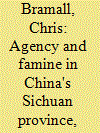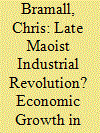| Srl | Item |
| 1 |
ID:
114581


|
|
|
|
|
| Publication |
2011.
|
| Summary/Abstract |
A revisionist literature on the Great Chinese Famine has emerged in recent years. These revisionists focus primarily on the question of agency. They claim that that neither poor weather nor the excesses of local cadres can explain the extent of mortality; rather, responsibility lies squarely with Mao and the CCP leadership. Using county-level data on mortality, output, rainfall and temperature for Sichuan province, I argue that this revisionist view is unconvincing. Weather admittedly played only a minor role, and the zealotry of the Party centre contributed significantly to the death toll. However, variations in mortality between Sichuan's counties appear to have been essentially random - suggesting that differences in local cadre responses to central government policy were decisive in determining the scale of famine.
|
|
|
|
|
|
|
|
|
|
|
|
|
|
|
|
| 2 |
ID:
074818


|
|
|
|
|
| Publication |
2006.
|
| Summary/Abstract |
The notion that the development strategy pursued in China after 1949 had transformed the economy of the People's Republic was a staple of Western scholarship at the close of the Maoist era. Jack Gray's work of the early 1970s stood squarely within this tradition. For him, Maoism was superior to Stalinism as a transitional path to socialism because it avoided the "urban bias" inherent in the primitive socialist accumulation suggested by Preobrazhensky, practised by Stalin, and advocated for China by (inter alia) Bo Yibo and Liu Shaoqi. Instead of extracting resources from the rural sector, the late Maoist development strategy revolved around labour accumulation: the mobilization of rural labour to carry out rural industrialization, agricultural mechanization and the extension of irrigation networks.
|
|
|
|
|
|
|
|
|
|
|
|
|
|
|
|
| 3 |
ID:
169796


|
|
|
|
|
| Summary/Abstract |
According to the conventional wisdom, the promise of the Chinese revolution of 1949 went unfulfilled in the Maoist era. Instead of taking off, the economy grew slowly, and widespread rural poverty persisted. The economic turning point was instead the famous political climacteric of 1976–78. But this metric of aggregates is the wrong criterion by which to judge China's economic record because industrial revolutions have regional beginnings. They invariably take place against a backcloth of slow aggregate growth and stagnant material living standards. Accordingly, we should dwell neither on China's slow overall growth nor its widespread poverty before 1978 but look instead for evidence of an emerging regional growth pole. This article argues that Jiangsu was such a growth pole in the late Maoist era, and that its record bears comparison with that of Lancashire and Yorkshire during the early years of Britain's industrial revolution. This holds out the intriguing possibility that a Chinese economic take-off, diffusing out of the Yangtze Delta, would have occurred even without post-1978 policy changes.
|
|
|
|
|
|
|
|
|
|
|
|
|
|
|
|